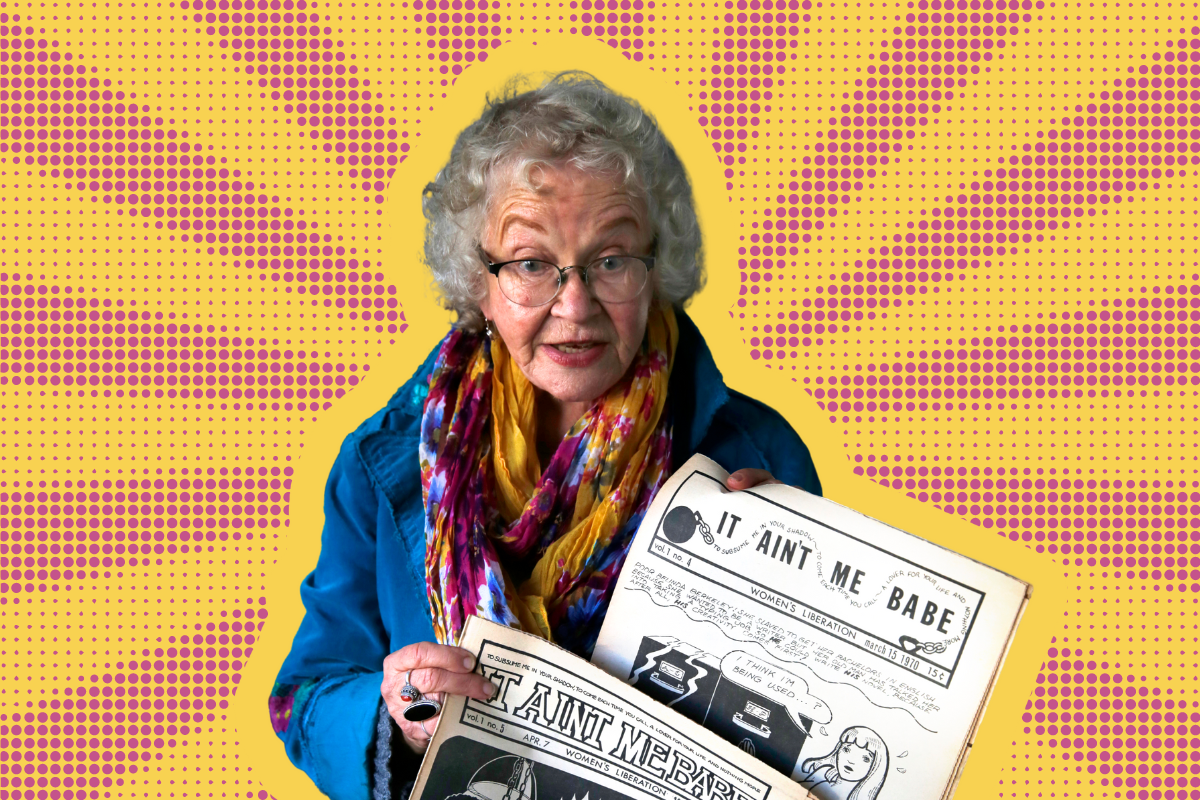The very first time I saw Trina Robbins speak, she declared: “I don’t like superheros — but I love Wonder Woman!” She was on the Jewish Folklore in Comics panel at JewCE (short for JewCE: The Jewish Comics Experience), the first annual Jewish Comic Convention focusing on Jewish content in comics and pop culture through the ages. It was a provocative statement, but it earned her my respect immediately — especially when I learned that she was the first woman to draw a full issue of “Wonder Woman” in 1986.
As a self-proclaimed Jewish nerd, I’ve always loved comics, and I especially loved studying the history behind them. What could be cooler, I thought, than reading books like “Superman Is Jewish? How Comic Book Superheroes Came to Serve Truth, Justice, and the Jewish-American Way” by Harry Brod and “Up, Up, and Oy Vey!: How Jewish History, Culture, and Values Shaped the Comic Book Superhero” by Simcha Weinstein, learning about the Jewish pop culture icons like Stan Lee (creator of Spiderman), Jerry Siegel and Joe Shuster (creators of Superman), Bob Kane and Bill Finger (creators of Batman), and seeing my own Jewish heritage reflected in the heroes I admired?
Which is why I was stunned to realize that I didn’t know anything about Trina Robbins sooner. As a self-proclaimed Jewish nerd and feminist, how could I have missed this brilliant, Jewish, nerdy, feminist icon? Maybe it was because of casual sexism in comics scholarship that focused primarily on male voices. Maybe it was because Trina’s career didn’t primarily focus on the Big Three in Mainstream Comics (i.e. Wonder Woman, Batman, and Superman), but on a number of independent and indie projects as well. Whatever it was, I was truly grateful to discover her when I did.
It was through JewCE and Trina’s memoir “Last Girl Standing” that I came to learn more about the work of this real-life pop culture heroine. Trina passed away last month, on April 10, 2024, and I had to sadly let go of my dream of one day interviewing her. Instead, I offer this profile, honoring the work she has done throughout her thoughtful, prolific career, and thanking her for the legacy she has made as a Jewish feminist comic book fan, creator and scholar that inspires and allows others like me to do the same. I hope those reading who are learning about Trina for the first time will feel the same joy and excitement I felt when first discovering her work.
Born on Aug. 17, 1938 in Brooklyn, New York, to two Jewish immigrants from Belarus, Trina discovered early on a love for words. She learned to read from her mother, a teacher, and quickly devoured all the books in her house. As a young girl, Trina visited the local candy store and would stop at the spinner rack full of comics, selecting only the ones with dynamic girls on the cover, such as Patsy Walker, Millie the Model, Katy Keene, and of course, Wonder Woman.
Later as a young woman working in the East Village, Trina opened up her own fashion shop, selling one-of-kind handmade outfits made from velvets, brocades and old lace. Designing for the likes of everyday customers and musicians such as Janis Joplin and Mama Cass, Trina’s store and Trina herself acted as gravitational forces, drawing in all kind of artists and innovators, including comic book writers — more commonly known as underground comix — a genre of comics usually self-published or published by a small press that experimented with storytelling and subjects that eluded mainstream comics at the time.
Trina’s eye for style and love for fandom (including science fiction) naturally drew her to the underground comix scene. However, upon interacting with other creators, she quickly discovered that many treated underground comix as a boys-only club.
Tired of the casual misogyny that filled many underground comix at the time, Trina decided to form her own project, “It Ain’t Me, Babe,” the first comic book created by an all-woman team. Trina collaborated with other female creatives such as Barbara “Willy” Mendes on “It Ain’t Me, Babe” and it was a game-changer, discussing female sexuality and dreams of liberation around the turn of the feminist movement in a field where it had barely been discussed before. Trina continued that line of work through projects such as the comics anthology, “Wimmen’s Comix,” which included her piece “Sandy Comes Out,” one of the first published comics in the world that discussed lesbianism in a respectful light.
Trina used her art for activism, drawing attention to important causes such as abortion rights through editing and contributing to the “Choices: A Pro-Choice Benefit Comic Anthology for the National Organization for Women,” and “Strip AIDS,” a project made to educate about HIV AIDS, while raising funds for those affected by AIDS.
Trina continued to break ground in the comic book world when she officially became involved with “Wonder Woman” comics in 1986. She became the first woman in the superheroine’s published history to draw her, as part of the four-issue limited series titled “The Legend of Wonder Woman.”
In addition to working on her own original content, including comic projects such as “Lily Renée, Escape Artist: From Holocaust Survivor to Comic Book,” a non-fiction comic based on the real-life story of artist and Holocaust survivor Lily Renée, and “A Minyen Yidn: A Bunch of Jews (And Other Stuff),” based on the stories of Trina’s father’s life growing up in a shtetl in Belarus and immigrating to Brooklyn, Trina made her mark as a comic book historian, or as she liked to say “herstorian.” In books such as “The Great Women Cartoonists” and “The Flapper Queens: Women Cartoonists of the Jazz Age,” Trina documented and highlighted female comic book trailblazers, making sure their stories would never be forgotten.
Now it’s our turn to make sure Trina’s story — a brilliant, inspiring one — is never forgotten.
May her memory be a blessing.



